29 March is a mixed bag both musically and in terms of quality, but there really aren’t any stand-out songs.
You say it, and I’ll pay it
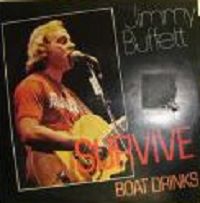 I’m getting a very strong Randy Newman vibe off of “Survive” by Jimmy Buffett (#77). It’s in the way Jimmy takes concrete, mundane details that we all can recognize from our everyday lives and turns them into an image that speaks depths about deep emotions, here love and loneliness. Who hasn’t on occasion opened up a telephone bill and gotten a green, sour feeling in their stomach? But here, Jimmy turns it into a symbol of how much he misses whoever he’s singing to: the daily (and costly) reminders of being away make his longing for her all the more poignant. The later verses make it clear that he’s missing his woman because he’s off on a tour — he doesn’t unpack for that one day’s visit because he has to go back and play some gig somewhere — and it’s usually a bad sign when a musician starts complaining in his song about how tough life is on the road, but at least in this song, it’s a good thing. And it’s a reminder that musicians (or any performers) are real people: no matter how much fun they look like they’re having on stage singing for the thousandth time about margaritas and volcanos, they’ve got real lives that they’d much rather be leading.
I’m getting a very strong Randy Newman vibe off of “Survive” by Jimmy Buffett (#77). It’s in the way Jimmy takes concrete, mundane details that we all can recognize from our everyday lives and turns them into an image that speaks depths about deep emotions, here love and loneliness. Who hasn’t on occasion opened up a telephone bill and gotten a green, sour feeling in their stomach? But here, Jimmy turns it into a symbol of how much he misses whoever he’s singing to: the daily (and costly) reminders of being away make his longing for her all the more poignant. The later verses make it clear that he’s missing his woman because he’s off on a tour — he doesn’t unpack for that one day’s visit because he has to go back and play some gig somewhere — and it’s usually a bad sign when a musician starts complaining in his song about how tough life is on the road, but at least in this song, it’s a good thing. And it’s a reminder that musicians (or any performers) are real people: no matter how much fun they look like they’re having on stage singing for the thousandth time about margaritas and volcanos, they’ve got real lives that they’d much rather be leading.
You’re a fool-hearted man
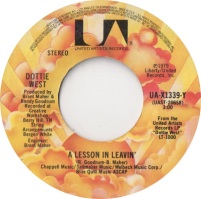 Has any hip-hop artist sampled the backbeat from “A Lesson in Leavin’” by Dottie West (#73)? Because if they haven’t they should: it’s got a funky little beat and, more importantly, that intro is about as clean a clip as you can possibly get — no need to stitch it together from other parts of the song, there it is in all it’s glory. Even the first vocal lines, the part over the backbeat with no other music, made me think that maybe this wasn’t the country song I was expecting it to be, that maybe Dottie West was some blue-eyed soul singer. But no, it’s country, but as country goes, this is pretty good. It’s not twangy or nasally. Really the only things that make this fit for the country stations is Dottie’s slight a Tennessee accent and the somewhat shrill female backing vocals. Well, and the lyrical content: the restrained vengeful reprimand from a wronged woman, and a few Southern turns of phrase. In a way, I’m surprised this wasn’t a bigger cross-chart hit, because it seems like it could have been an easy fit on the top 40 and easy listening stations as well as the country chart it topped.
Has any hip-hop artist sampled the backbeat from “A Lesson in Leavin’” by Dottie West (#73)? Because if they haven’t they should: it’s got a funky little beat and, more importantly, that intro is about as clean a clip as you can possibly get — no need to stitch it together from other parts of the song, there it is in all it’s glory. Even the first vocal lines, the part over the backbeat with no other music, made me think that maybe this wasn’t the country song I was expecting it to be, that maybe Dottie West was some blue-eyed soul singer. But no, it’s country, but as country goes, this is pretty good. It’s not twangy or nasally. Really the only things that make this fit for the country stations is Dottie’s slight a Tennessee accent and the somewhat shrill female backing vocals. Well, and the lyrical content: the restrained vengeful reprimand from a wronged woman, and a few Southern turns of phrase. In a way, I’m surprised this wasn’t a bigger cross-chart hit, because it seems like it could have been an easy fit on the top 40 and easy listening stations as well as the country chart it topped.
I kept my promise
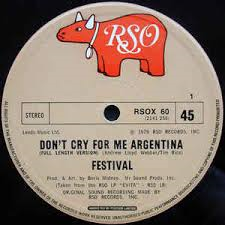 As you can probably imagine, “Don’t Cry for Me Argentina” by Festival (#72) is a disco version of the song from the hit Broadway musical, Evita, and as you can probably imagine, it’s really horrible. I’m not going to go into my distaste of Evita, what with it being a celebration of the puppet-wife of a quasi-fascist dictator; I’ll just say that I generally don’t much like musicals to begin with because of how most of them, Evita included, artificially force a story and music together into some sort of lumbering Frankenstein creature. But then to discofy it, makes an even clunkier Frankenstein beast. Keep your distance.
As you can probably imagine, “Don’t Cry for Me Argentina” by Festival (#72) is a disco version of the song from the hit Broadway musical, Evita, and as you can probably imagine, it’s really horrible. I’m not going to go into my distaste of Evita, what with it being a celebration of the puppet-wife of a quasi-fascist dictator; I’ll just say that I generally don’t much like musicals to begin with because of how most of them, Evita included, artificially force a story and music together into some sort of lumbering Frankenstein creature. But then to discofy it, makes an even clunkier Frankenstein beast. Keep your distance.
Clouds burst to give water
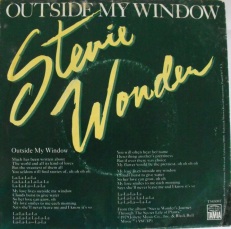 I’m going to sing the praises of Stevie Wonder again, not because I think “Outside My Window” (#52) is a particularly good song, but because it’s an interesting song with a something of an interesting story. You see, it’s literally a love song to a flower. Why? Well, this song, and the entire album it’s from, are the soundtrack to The Secret Life of Plants, a documentary furthering the theory that plants are at least semi-sentient. First off, you have to be really brave to write and perform an entire soundtrack in support of such a thesis; I’ve already said on this blog that Stevie Wonder is one of the few people so far in 1980 who was taking any musical risks, and here he is doing it again, with a moderate amount of mainstream success. Not only is the whole project a bit weird, but it’s even weirder — and braver — to have a blind guy write music to accompany a movie about so visual a topic as plants. The Wikipedia article for the album talks briefly about how Stevie Wonder went about doing this, having the producer describe what the scenes in the movie look like so he could write fitting accompaniment, and frankly, that takes guts on the part of everyone involved. Not having seen the film, I can’t say if the result works as a soundtrack, but this single is at least interesting: a musically odd piece, with reduced chords, jazzy construction, and a weird squishy noise serving as percussion. Do I want to listen to this a lot? No. Was it refreshing to hear a few times? Absolutely.
I’m going to sing the praises of Stevie Wonder again, not because I think “Outside My Window” (#52) is a particularly good song, but because it’s an interesting song with a something of an interesting story. You see, it’s literally a love song to a flower. Why? Well, this song, and the entire album it’s from, are the soundtrack to The Secret Life of Plants, a documentary furthering the theory that plants are at least semi-sentient. First off, you have to be really brave to write and perform an entire soundtrack in support of such a thesis; I’ve already said on this blog that Stevie Wonder is one of the few people so far in 1980 who was taking any musical risks, and here he is doing it again, with a moderate amount of mainstream success. Not only is the whole project a bit weird, but it’s even weirder — and braver — to have a blind guy write music to accompany a movie about so visual a topic as plants. The Wikipedia article for the album talks briefly about how Stevie Wonder went about doing this, having the producer describe what the scenes in the movie look like so he could write fitting accompaniment, and frankly, that takes guts on the part of everyone involved. Not having seen the film, I can’t say if the result works as a soundtrack, but this single is at least interesting: a musically odd piece, with reduced chords, jazzy construction, and a weird squishy noise serving as percussion. Do I want to listen to this a lot? No. Was it refreshing to hear a few times? Absolutely.
Invisible airwaves crackle with life
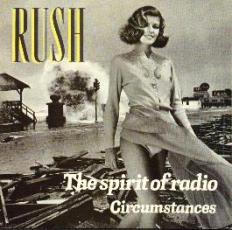 I have never been much of a fan of Rush, but I respect what they do with music, because, like Stevie Wonder, they try and succeed in doing interesting things with music that few people were trying to do on the top 40 charts. “The Spirit of Radio” (#51) is a perfect example of them doing this. They have their trademark soaring guitars and complicated rhythms that lift a listener beyond the standard rock n’ roll beat with the predictable verse-chorus-verse-chorus-chorus structure. Instead of the music being a vessel for the lyrics, Rush seems to use lyrics as packaging for the interesting things they’ll do with the music, as if they’re bribing us to listen to their musical mastery by giving us words to listen to. Not that the lyrics are lightweight: no, Rush has written a song about the power of music to capture people’s imaginations, but also about how easily such a force for liberation can be corrupted by the allure of fame that categorizes, delegitimizes, and sanitizes music. Rush is railing against the top 40 radio they successfully broke into (well, in Canada and Britain anyway, where this song went to #13 ad #22 respectively), and I’m all for subversiveness like that. And then toward the end, they throw in some reggae, just to keep us on our toes.
I have never been much of a fan of Rush, but I respect what they do with music, because, like Stevie Wonder, they try and succeed in doing interesting things with music that few people were trying to do on the top 40 charts. “The Spirit of Radio” (#51) is a perfect example of them doing this. They have their trademark soaring guitars and complicated rhythms that lift a listener beyond the standard rock n’ roll beat with the predictable verse-chorus-verse-chorus-chorus structure. Instead of the music being a vessel for the lyrics, Rush seems to use lyrics as packaging for the interesting things they’ll do with the music, as if they’re bribing us to listen to their musical mastery by giving us words to listen to. Not that the lyrics are lightweight: no, Rush has written a song about the power of music to capture people’s imaginations, but also about how easily such a force for liberation can be corrupted by the allure of fame that categorizes, delegitimizes, and sanitizes music. Rush is railing against the top 40 radio they successfully broke into (well, in Canada and Britain anyway, where this song went to #13 ad #22 respectively), and I’m all for subversiveness like that. And then toward the end, they throw in some reggae, just to keep us on our toes.
Burned up my childhood days
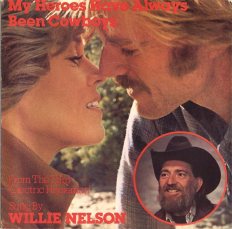 “My Heroes Have Always Been Cowboys” by Willie Nelson (#44) is a straightforward cover of a song by Waylon Jennings from 1976 from the soundtrack to The Electric Horseman, which I’ve never seen, or even heard of. I was always befuddled that my moth and my two uncles had a fascination with cowboys — and the wild west in general — similar to the sentiments of this song. Cowboys have never meant anything to me, and I certainly never had the idea that they were a cohort of noble savages who fought for law and justice despite being barely civilized themselves. But my mother and her brothers would reminisce about Bonanza and Gunsmoke, speaking a language I barely understood, despite it being English. Of course, their parents’ generation created those shows about their parents’ generation, something along the lines of my generation creating Argo, Apollo 13, and Mad Men. So, even though my heroes have never been cowboys, this song has its place; it’s just not in my record collection.
“My Heroes Have Always Been Cowboys” by Willie Nelson (#44) is a straightforward cover of a song by Waylon Jennings from 1976 from the soundtrack to The Electric Horseman, which I’ve never seen, or even heard of. I was always befuddled that my moth and my two uncles had a fascination with cowboys — and the wild west in general — similar to the sentiments of this song. Cowboys have never meant anything to me, and I certainly never had the idea that they were a cohort of noble savages who fought for law and justice despite being barely civilized themselves. But my mother and her brothers would reminisce about Bonanza and Gunsmoke, speaking a language I barely understood, despite it being English. Of course, their parents’ generation created those shows about their parents’ generation, something along the lines of my generation creating Argo, Apollo 13, and Mad Men. So, even though my heroes have never been cowboys, this song has its place; it’s just not in my record collection.
Stab you in the back with a switchblade knife
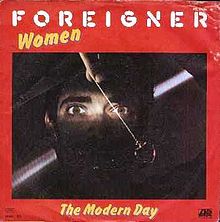 The don’t make casual misogyny like “Women” by Foreigner (#41) anymore. The lyrics are just a rundown of all sorts of women in the world: behind bars, in airplanes, in magazines, limousines, who need a shove, and, as if it were unusual, with their clothes on. None of these women seem to be particularly nice or even pleasant, and the only thing that makes them interesting is the situation they happen to be in. I mean, those women behind bars got there somehow, but Foreigner doesn’t seem to care about that beyond the fact that they’re bad girls. So, what does this song say about women? That they exist, that they can be dangerous, and that sometimes you need to rough them up. No thanks.
The don’t make casual misogyny like “Women” by Foreigner (#41) anymore. The lyrics are just a rundown of all sorts of women in the world: behind bars, in airplanes, in magazines, limousines, who need a shove, and, as if it were unusual, with their clothes on. None of these women seem to be particularly nice or even pleasant, and the only thing that makes them interesting is the situation they happen to be in. I mean, those women behind bars got there somehow, but Foreigner doesn’t seem to care about that beyond the fact that they’re bad girls. So, what does this song say about women? That they exist, that they can be dangerous, and that sometimes you need to rough them up. No thanks.
You know I’m not that strong
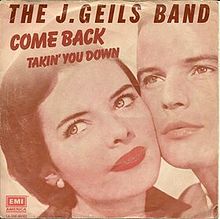 “Come Back” by The J. Geils Band (#32) presages a time when the charts would be dominated by songs that occupy the intersection of rock, dance, and new wave, synthesizer-driven songs that nonetheless rock and get people out into the shadow of the disco ball. If this song had been released in, say, 1982 alongside “Golden Earring’s “Twilight Zone”, I think it would have been a huge hit. Not that #32 is a bad showing or anything, but with more polish and an audience more primed to hear music in this vein, it’d’ve been big.
“Come Back” by The J. Geils Band (#32) presages a time when the charts would be dominated by songs that occupy the intersection of rock, dance, and new wave, synthesizer-driven songs that nonetheless rock and get people out into the shadow of the disco ball. If this song had been released in, say, 1982 alongside “Golden Earring’s “Twilight Zone”, I think it would have been a huge hit. Not that #32 is a bad showing or anything, but with more polish and an audience more primed to hear music in this vein, it’d’ve been big.
Give it all you got
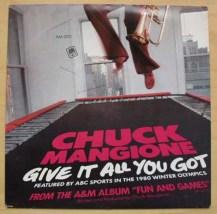 My father loved Chuck Mangione. I never regarded him as anything more than harmless. Given all the other things we might have been listening to on the way to school, I far preferred Chuck Mangione over some of the other available options. I don’t explicitly remember “Give It All You Got” (#18), but frankly it sounds like all the other smooth jazz I’ve heard in my life. At least it actually sounds like jazz, unlike a lot of the other stuff I’ve heard on smooth jazz stations. (Once I heard “Moments in Love” by the Art of Noise on a smooth jazz station, which pushes the definition of jazz to a ridiculous extent.) Anyway, I feel the same way about “Give It All You Got” — it’s harmless, and at least it showcases trumpet, which doesn’t happen very often in top 20 singles.
My father loved Chuck Mangione. I never regarded him as anything more than harmless. Given all the other things we might have been listening to on the way to school, I far preferred Chuck Mangione over some of the other available options. I don’t explicitly remember “Give It All You Got” (#18), but frankly it sounds like all the other smooth jazz I’ve heard in my life. At least it actually sounds like jazz, unlike a lot of the other stuff I’ve heard on smooth jazz stations. (Once I heard “Moments in Love” by the Art of Noise on a smooth jazz station, which pushes the definition of jazz to a ridiculous extent.) Anyway, I feel the same way about “Give It All You Got” — it’s harmless, and at least it showcases trumpet, which doesn’t happen very often in top 20 singles.
You don’t need that heart of stone
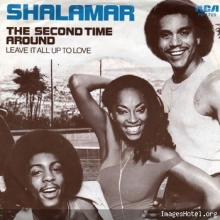 Shalamar, at least in “The Second Time Around” (#8) is everything I hate about disco. Its mix is all front-loaded, which makes it sound like a TV commercial, even the bass guitar sounds like it’s treble, it has silly little sound effects to remind you when to point your gold ring-encrusted finger at the air conditioning vent while you boogie, and the lyrics are, well, boring. “The second time is so much better, baby; and I’ll make it better than the first time.” Honey, don’t do it! He’s going to trample all over you again, just like he is this monotonous disco beat!
Shalamar, at least in “The Second Time Around” (#8) is everything I hate about disco. Its mix is all front-loaded, which makes it sound like a TV commercial, even the bass guitar sounds like it’s treble, it has silly little sound effects to remind you when to point your gold ring-encrusted finger at the air conditioning vent while you boogie, and the lyrics are, well, boring. “The second time is so much better, baby; and I’ll make it better than the first time.” Honey, don’t do it! He’s going to trample all over you again, just like he is this monotonous disco beat!
Together we can learn to grow
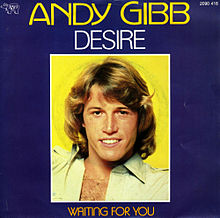 “Desire” by Andy Gibb (#4) starts out sounding like something dark and stormy, but it doesn’t last long. Unfortunately, Andy Gibb has to remind you that he’s a Bee-Gee but blurting out a few breathy gasps right out of “Stayin’ Alive”. Fortunately, there’s a bit of a reggae shuffle beat underlying “Desire” that may distract you from the fact that the vocals are delivered at such a high falsetto as to be unintelligible. Unfortunately, there’s a lot of those falsetto vocals. And the lyrics are some sort of mélange of world peace nonsense, juxtaposing opposite states and then suddenly springing on the woman in question that Andy’s totally smitten with her. Presumably is such a confusing world, the only thing he knows is that he’s infatuated. The only think I know is I’m waiting for next week.
“Desire” by Andy Gibb (#4) starts out sounding like something dark and stormy, but it doesn’t last long. Unfortunately, Andy Gibb has to remind you that he’s a Bee-Gee but blurting out a few breathy gasps right out of “Stayin’ Alive”. Fortunately, there’s a bit of a reggae shuffle beat underlying “Desire” that may distract you from the fact that the vocals are delivered at such a high falsetto as to be unintelligible. Unfortunately, there’s a lot of those falsetto vocals. And the lyrics are some sort of mélange of world peace nonsense, juxtaposing opposite states and then suddenly springing on the woman in question that Andy’s totally smitten with her. Presumably is such a confusing world, the only thing he knows is that he’s infatuated. The only think I know is I’m waiting for next week.

Glad you are back – I’ve missed these overviews.
LikeLike
Are you having a hiatus? Bit worried you might not be back.
LikeLike
I’m here… the hiatus is because of a brutal work schedule that should clear up soon.
LikeLiked by 1 person
Oh good
LikeLike